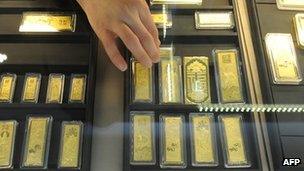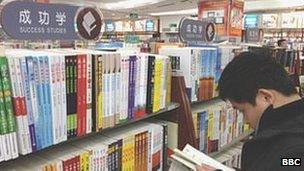Entrepreneurial spirit takes hold in China
- Published

Gold is being promoted as an attractive investment commodity in China
Not long ago, capitalism was a dirty word in communist China - it was impossible to start your own business or think about getting rich.
But all that changed with a series of economic reforms launched three decades ago that unleashed a wave of entrepreneurial spirit.
Many Chinese people now spend much of their free time thinking, reading and learning about how to get ahead.
They turn to seminars, self-help books and novels in search of inspiration and to help them understand the rules of this new game.
One firm looking to help - and cash in - on this thirst for knowledge is Hengtaidatong Gold, which tries to persuade people to invest in this precious metal.
Every few weeks it organises glitzy gatherings for Beijing's well-heeled residents to teach them how to make money from this valuable commodity.
Silver-tongued compere
At one of them, potential investors were gently ushered into comfortable leather seats and offered Italian coffee or Chinese tea.
The event, held in a coffee shop in Beijing's central business district, was hosted by silver-tongued compere Zhan Weisheng.
"Previous generations never even thought about investing money because they were poor. They were just concerned about having enough food and warm clothes," Mr Zhan told the BBC.

Zhan Weisheng teaches Chinese investors about how to invest their money
"But because the economy's now booming, that problem's been solved and people have money, so naturally they have to think about how to invest it."
Mr Zhan and the team at Hengtaidatong hope to direct investors towards their own products, although they present their gatherings as attempts to learn. The host called it a "salon".
"This isn't a lecture - this is supposed to be relaxing. It's us learning together about how to invest in gold," he told the audience as they settled into their seats.
Mr Zhan's main tool of instruction was a game, using fake gold bars, pretend cash and real-life scenarios.
The audience were given a set amount of gold and money, and then had to make investment choices after being told information that could affect the price of the precious metal.
The death of Osama Bin Laden, the bombing of Libya by Nato planes and the down-grading of credit ratings for certain European countries were all events that investors had to factor into their calculations.
A group of smartly dressed and attractive assistants buzzed around the room with calculators to help those having trouble with their sums.
Mr Zhan did his job well. After the session, 20 people said they would buy gold worth about one million yuan ($159,000; £99,000).
Of course, the price of gold, which has reassuringly risen sharply over the last decade, must have helped investors make up their minds.
Self-help powers
Seminars are not the only way to learn about making money. There are also thousands of self-help books.
Beijing salesman Luo Peng is one of those who believe in their educational powers.
The 29-year-old, who sells computer services, read dozens of these books when he was learning how to perfect the art of selling.
One is called The Psychology of Selling by Brian Tracy. The book's sub-title promises its readers they will learn how to sell more, easier and faster than they ever thought possible.

Self-help books are also gaining popularity among those seeking wealth
Mr Luo now stands while talking to customers on the telephone, a habit he picked up after reading about one Japanese master salesman.
"One day he went home, got changed into his pyjamas and laid on his bed. At that point, there was a call from a client," said Mr Luo.
"Before answering the call, he got changed into his suit and tie and stood up, because only then did he feel like a proper salesman."
Mr Luo said he stands when talking on the phone because that is how he feels professional.
Novels also provide inspiration for those who dream of leaving poverty behind and finding wealth in the new capitalist China.
Many tell stories of poor farmers who rise through the ranks of top companies.
These books are not always read just for fun, but for what practical information they might contain.
"There isn't a recent legacy of reading for pure pleasure, the idea of reading because it makes you feel nice," said Jo Lusby, the head of Penguin books in China.
"Typically in adult and teen publishing, it's a sense of what do I know at the end of this book that I didn't know at the beginning - and ideally how will it help me get a better job."
Getting a better job, making money and starting a business are relatively new concepts in China - but they are all occupying the thoughts of the people who live here.